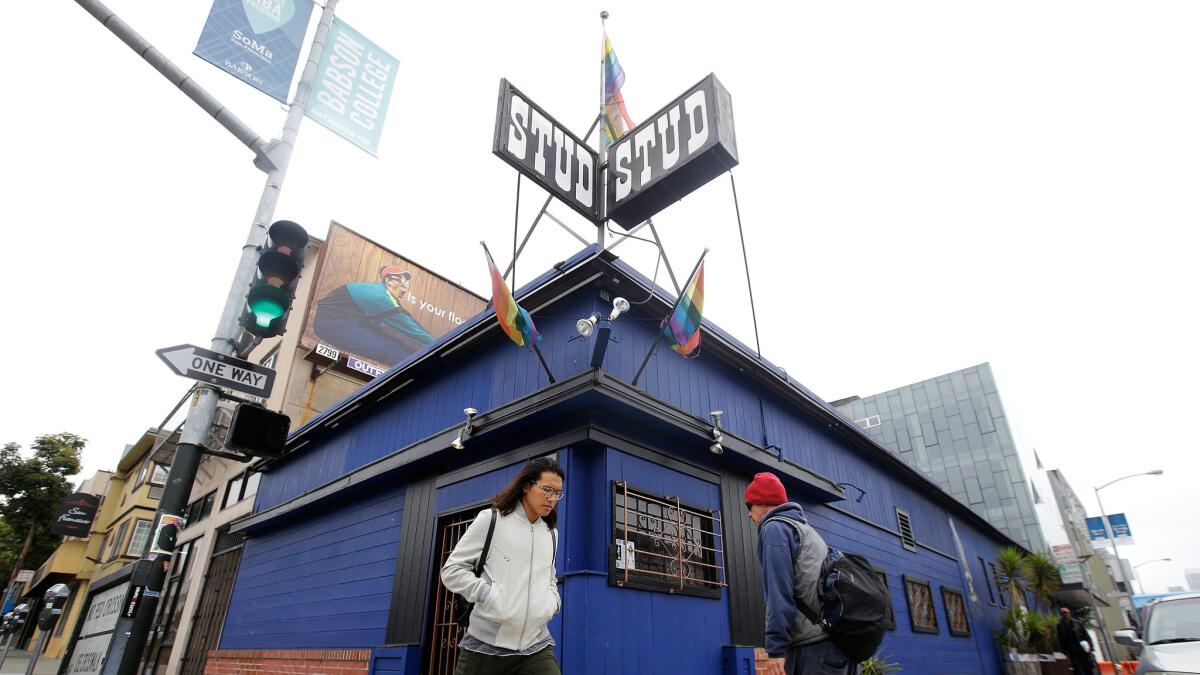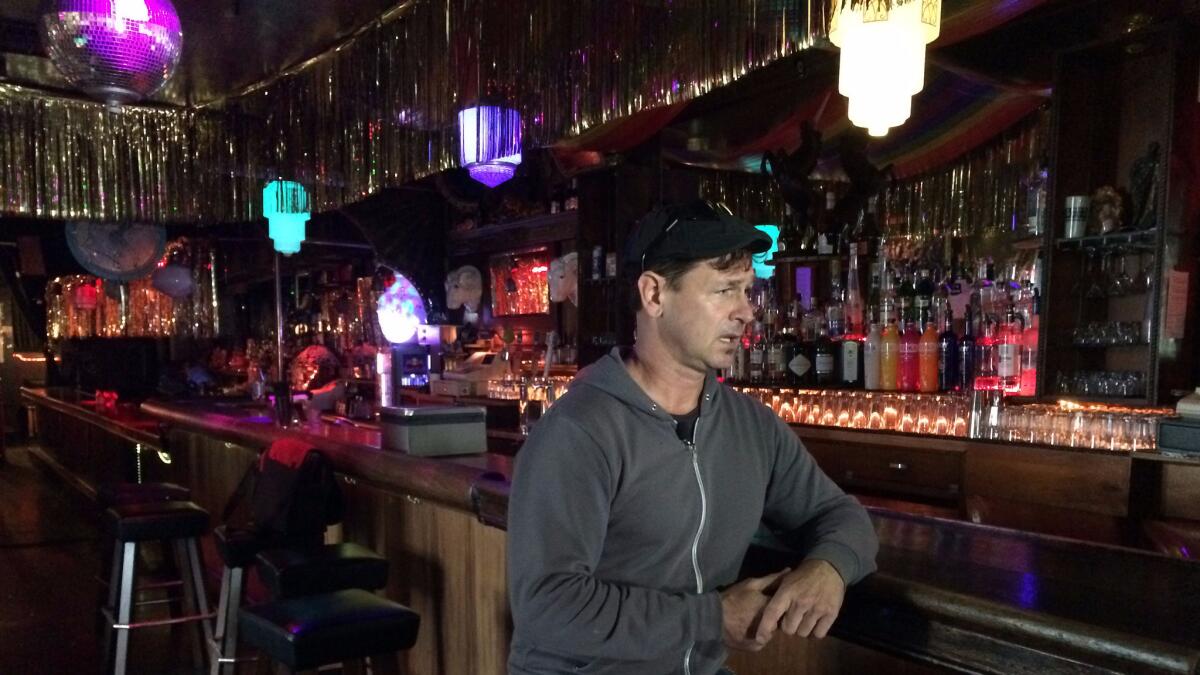San Francisco’s old-school gay bars are disappearing as the city changes

- Share via
One of the nation’s most celebrated gay bars may soon go out of business after a new landlord more than doubled the rent, part of a trend that has old-timers lamenting that the San Francisco they know and love — dilapidated and diverse — is disappearing.
At 50 years old, the Stud is the longest continuously running gay bar in the city and known throughout the country as one of the bohemian, gender-bending, anything-goes institutions that made San Francisco into a gay mecca. A sign at the front door, decorated with gold tinsel, reads: “Everybody is welcome at The Stud. Dream It. Be It.”
In June, the building was sold, and the bar’s owner received a notice that the monthly rent for the 2,800-square-foot space would leap from $3,800 to $9,500 in September. On Sunday, he called an emergency meeting to break the news to regulars.
The tale is familiar in a city that is becoming ever wealthier with the arrival of newcomers taking high-paying technology jobs downtown or in nearby Silicon Valley. San Francisco has steadily shed coin-op laundries, neighborhood dive bars and auto-repair shops — all certainly part of natural turnover but hurried along by changing owners and rising rents.
In 1992, nearly 1,300 businesses closed or changed locations, according to a 2014 report by the city’s budget and legislative analyst. By 2011, that number had grown to nearly 12,800. Last year, voters approved a preservation fund to financially assist longtime small businesses and nonprofits that face steep rent increases.
The Stud could qualify for such help, but it is operating on a month-to-month lease, without the protection of a long-term lease. An agent for the building’s new owner, City Commercial Investments LLC, could not be reached for comment on plans for the property.
The rent increase is “not out of the realm of what San Francisco rents are like now,” Stud owner Michael McElhaney said. “But being the type of business we are, doing cabaret shows and drag and having primarily weekend and evening business, it’s definitely a tough challenge.”

The Stud is in South of Market, a still gritty and historically gay part of San Francisco where developers are rapidly building condos and restaurants to cater to tech workers who can afford $4,500 for a one-bedroom apartment. Across the street is Thumbtack, a startup where Jeb Bush held a town hall last year as part of his failed presidential bid, famously arriving in an Uber. The once-empty lot next to the bar is being turned into housing.
The Stud opened in 1966 and quickly gained a reputation as a spot with a hippie vibe and eclectic customers. Inside its current space, there are gilt mirrors and a disco ball and a small performance stage.
“The minute you come in, you just feel this warmth. It’s not just the people. I know that’s kind of odd to say, but it’s the building, and everyone mentions it when they come in,” said bartender Bernadette Fons, who has worked there for a decade.
Most regulars live within walking distance, including Chris Coombs, a 31-year-old merchant marine who stopped by the Stud on Tuesday evening to enjoy a Pabst with his boyfriend.
“With all the changes that are going on, with all the new construction, there’s a sense that this culture and everything that finds a home at this bar is sort of being diluted,” Coombs said. “It’s hard to see something like that sort of pushed aside, which is almost what it feels like.”
Coombs remembers the first time he visited the bar, seven years ago, as does his boyfriend, Roy Huber, who was introduced to the place two decades ago by his mom’s best friend’s marijuana dealer. So does McElhaney, who walked into the bar in the summer of 1987 and knew that he had come home.
It’s not just the people. I know that’s kind of odd to say, but it’s the building, and everyone mentions it when they come in.
— Bernadette Fons, bartender
“I walked into a room full of people that was so diverse, mixed, strange, beautiful,” McElhaney said. “It just felt like the most beautiful mix of imagery and people and music that I’d ever experienced in my life and I fell in love immediately.”
In 1996, on his birthday, he bought the business with a colleague who has since died. Now, McElhaney said, he wants to return to Honolulu, to be with his aging mother.
But before he does, he wants to make sure the bar is in good hands.
Mica Sigourney, who performs under the drag name VivvyAnne Forevermore!, is working to form a cooperative to buy the business. He moved to the city a dozen years ago.
“San Francisco has changed a lot since I first got here,” he said. “I think it’s been changing so much in the past few years.”
The bar is expected to stay open through September.
ALSO
Oakland police scandal raises fears about the city’s fight against sex trafficking
UCLA, UC Berkeley boost admissions of Californians, including blacks and Latinos
Bay Area man charged with attacking Google campus, destroying self-driving car
More to Read
Sign up for Essential California
The most important California stories and recommendations in your inbox every morning.
You may occasionally receive promotional content from the Los Angeles Times.










